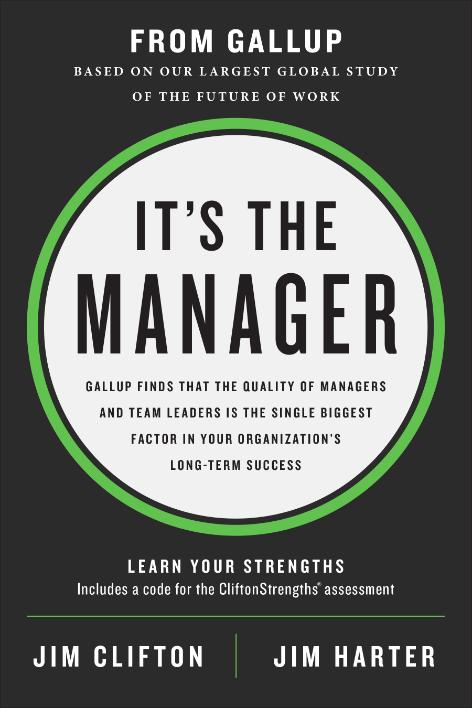Story Highlights
- A growing professional labor pool necessitates management development
- Knowledge workers require professional management
- Most front-line supervisors lack people management skills
Gallup recently discovered that 48% of U.S. workers -- most of them not engaged or actively disengaged -- are looking for a new job or keeping an eye on opportunities. The "help wanted" signs blanketing cities and recruiter messages filling inboxes are telltale, and open positions are at a record high.
It's called the "Great Resignation," and it will likely sort itself out over the next year or so as unemployment runs out, children return to school and people are safer in groups.
But following that megatrend will be another problem: an insufficient number of managers to coach the enormous pool of professional labor automation will create. That problem has the potential to be far more damaging than the Great Resignation -- but it's also far easier to solve.
Automation and managing change in the workplace
That labor pool has, Gallup finds, unique expectations and needs -- not just in terms of pay, but also engagement, development, flexibility, autonomy and wellbeing. The World Economic Forum's The Future of Jobs Report 2020 finds that automation will require that pool to expand by 97 million people in fields like data analysis, digital marketing and software development. So, managers able to coach knowledge workers will be in serious demand because outdated management practices torpedo the performance of professionals.
Why? A knowledge worker's role requires collaboration and decision-making across matrixed and complex structures, so evaluating their performance is subjective -- coaching it is even more so. And because their employment options are numerous and growing, retention efforts are crucial. Gallup finds that the talented are among the first to go.
Therefore, managing knowledge workers is complex. It requires highly developed professional managers who can coach an employee's individual strengths, handle ambiguity, guide creativity and achieve outstanding performance sustainably at scale. Yet, Gallup finds that 82% of the time, companies name the wrong person manager.
Supervisors vs. managers
It is almost unthinkable that today's front-line supervisors will be capable of pivoting from their current practice to coaching 97 million high-skilled knowledge workers.
Unthinkable because most front-line supervisors aren't actually managers. Typically drawn from the ranks of those they manage, supervisors are taught to administer and evaluate the tasks of workers who have relatively moderate levels of education, pay and autonomy. Many of these roles are among the 85 million jobs that the World Economic Forum estimates will cease to exist in the next five years.
Those employees will be the first automated into extinction. Second will be their supervisors.
That puts supervisors in the uncomfortable position of overseeing the demise of their own labor sector. Meanwhile, their employers foresee a looming management crisis: As the need for supervisors dwindles, the need for a corps of professional managers will explode -- and the bench is not full.
Why leaders need to have a development plan for managers
There's no reason that today's supervisors can't be tomorrow's professional managers. But the selection criteria for supervisors generally relates to their success or tenure in a front-line role, not their capacity for people management -- today's current pool of knowledge workers may offer a richer management resource. In any case, even those with the capacity for people management need tailored development that prepares them to meet the future-of-work demands of professional management.
Many of these roles are among the 85 million jobs that the World Economic Forum estimates will cease to exist in the next five years.
For instance, professional managers will need to be highly capable coaches, not bosses. They will need to be able to conduct ongoing, strengths-based conversations with employees. They must be taught to help workers achieve their organizational objectives, innovate, use their strengths to grow and consistently achieve higher levels of performance. In an ever-changing environment, managers will need to care about employees' wellbeing and respond to their needs. And they'll need to know how to motivate the discretionary effort that propels organizations past competitors.
Professional managers must also be adaptable. Though human workplace needs are consistent across roles -- Gallup's Q12 engagement assessment was validated based on research from 2.7 million workers worldwide -- the nature of the work will be different. And managers will need to individualize to each employee's wellbeing needs or risk further eroding the diversity, inclusion and retention efforts that the pandemic destabilized.
Even those with the capacity for people management need tailored development that prepares them to meet the future-of-work demands of professional management.
Managers can learn many of those skills and abilities -- Gallup has taught them to hundreds of thousands of managers. Highly developed, professional managers are crucial to their companies, and the ROI is apparent in their workplace engagement, turnover rates, wellbeing reports, ESG initiatives and, most importantly, P&L sheets.
Soon -- and probably sooner than we think -- that contingent of professional managers will need to grow exponentially. In the future, companies will only succeed if they have talented and engaged managers with the mindset, skillset and toolset to meet the needs of professional employees. Some of those managers are already on staff. They just need the investment that will prepare them to manage at a professional level.
Right now, very few businesses are prepared to manage the workforce of the future -- but getting up to speed in time is not impossible. It's not just possible. It's necessary. Identifying and developing managers is the key to the future of work, and the future is approaching quickly.
Develop managers who can lead the workforce of the future:
- Partner with Gallup to identify and develop future-ready leaders.
- Invest in your managers' strengths with our CliftonStrengths for Managers report.





